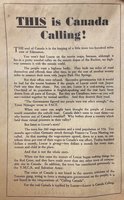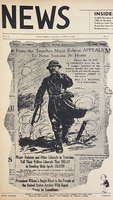Canada's Ill-Prepped War Effort
During her time at the Globe and Mail, Judith Robinson was conscious of the lack of honest press regarding wartime efforts in Canada. Moreover, she found the prominence of President Mackenzie King’s immobility especially distressful. In 1940, Robinson and editor Oakley Dalgleish were fired from the Globe and Mail after which they founded NEWS, their own newspaper. [i]
“Canada Calling” was a segment run by Robinson and Dalgleish which was included in other Canadian newsletters and regarded critique of Canada’s ill war preparation. It emphasized the topic of conscription, most notably the soldiers who were ignored despite wanting to work. [ii] Daniel Byers' article further illuminates the lack of investment for war equipment such as weapons and tanks. What's more is that this lack of effort perverse despite many Canadians wanting more from Canada on the war front, and even being willing to contribute their own efforts. [iii] The 1940 National Resources Mobilization Act seemingly aimed to authorize conscription by controlling wealth and shifting efforts towards industrialization. [iv] Moreover, the army had pressured men who were stationed at home to serve overseas. [v] It is for these reasons that Robinson wanted to establish a truthful newspaper; it can be inferred that the censorship surrounding these wartime issues became too prominent for contemporaries and Robinson sought to appease them by bringing light to the truth.
Another rising concern during the years leading up to the establishment of NEWS was the hospital accommodation for wounded soldiers. The Christie Street Hospital was the main facility used to treat wounded and disabled Canadian soldiers. However, it was an inadequate building, and demands for a safer hospital at Sunnybrook Park, Toronto were rising. [vi]
The Royal Commission on Dominion-Provincial Relations was an attempt to provide aid for healthcare during war times. They operated during a time of integration between regions in Canada that aimed to recover from the Great Depression. [vii]. In 1940, the Commission agreed to provide the aid necessary for wartime emergencies, and it needed help from Canadian provinces through taxation and grants. [viii]
Hence, the establishment of NEWS coincided with a prominent concern for citizen and military healthcare. The issues surrounding Robinson would have compelled her to create a paper which accommodated to contemporary interests. This would grant her a great number of readers who wished to be kept in line with these concerns. Her articles further show her dedication in informing the general populace, as the amount of detail means she would have been doing research and planning correspondence around the topics.


